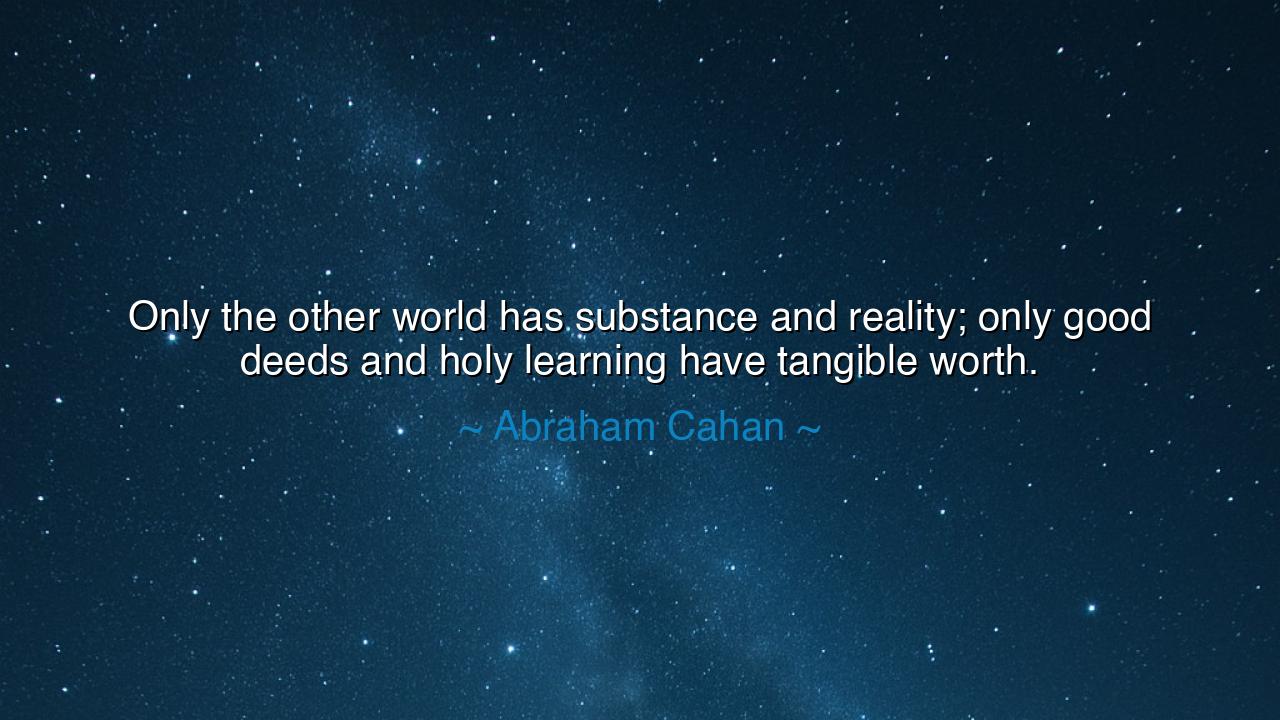
Only the other world has substance and reality; only good deeds
Only the other world has substance and reality; only good deeds and holy learning have tangible worth.






“Only the other world has substance and reality; only good deeds and holy learning have tangible worth.” – Abraham Cahan
These words, spoken by Abraham Cahan, rise like an echo from the soul of a man who had witnessed both the splendor and the sorrow of the human condition. Born among immigrants, raised amidst struggle, and matured in the fire of ideals, Cahan understood deeply the fleeting nature of worldly success. In this solemn truth, he declares that all that we chase in this life — wealth, fame, comfort — is but a shadow upon the wall, while the other world, the realm of spirit, virtue, and divine understanding, is the only place where substance and reality truly dwell.
The origin of this quote can be traced to Cahan’s life as both a writer and a moral philosopher — a man who straddled two worlds: the physical world of labor, poverty, and human ambition, and the spiritual world of conscience, purpose, and learning. Having lived among the immigrant poor of New York, he saw the endless toil of men and women seeking prosperity, only to find emptiness when gold could not fill their hearts. In their faces, he discerned a timeless truth: that the value of existence does not lie in what we own or achieve, but in the good deeds we sow and the holy learning — the wisdom of compassion, humility, and faith — that we cultivate along the way.
The “other world” Cahan speaks of is not only the realm beyond death, but the invisible world that already lives within us — the world of conscience, of moral law, of divine truth. The material world dazzles the senses, but it is as mist before the morning sun. Wealth vanishes, beauty fades, power corrodes. Yet a single act of kindness, a single word of truth, a single selfless deed — these endure, written not upon stone or paper, but upon the eternal soul. Cahan reminds us that while the earth measures worth by possession, heaven measures it by intention.
History itself bears witness to this truth. Consider the life of Saint Francis of Assisi, who was born to wealth and privilege but cast it aside to live in poverty and service. To his father’s fury, he exchanged silk for sackcloth, gold for faith, and comfort for compassion. The world thought him a fool, yet centuries later, his name shines brighter than the crowns of kings. His good deeds became his monument; his holy learning — the wisdom of love and humility — became his legacy. In forsaking the illusions of the material, he discovered the reality of the eternal.
In Cahan’s vision, “holy learning” does not mean mere study of sacred texts, but the pursuit of wisdom that uplifts the soul. It is the learning that refines the heart as much as the mind — the knowledge of mercy, the understanding of patience, the comprehension of one’s place in the divine order. The ancients called this gnosis, the knowledge that transforms rather than inflates. The scholar who learns but does not love gains only dust; the peasant who learns to be kind, grateful, and just attains heaven’s favor. Learning becomes “holy” when it leads to goodness, not arrogance.
Yet Cahan’s insight also carries a tone of mourning — a lament for a world that has forgotten what is truly tangible. Men chase illusions: wealth that slips through fingers, pleasures that wither, power that dies with the body. They build empires of sand and call them eternal. But in the silence of old age, or the shadow of death, these false treasures dissolve. What remains is what we have done for others, what love we have given, and what wisdom we have shared. The other world — the realm of the soul — proves itself the only reality that does not decay.
So, my children, heed this teaching: do not mistake appearance for essence. The truest riches cannot be counted; the most lasting legacy cannot be held. Cultivate good deeds, for they are the seeds of eternity. Pursue holy learning, for it alone endures when all else perishes. Let your heart dwell in the world of spirit even as your feet walk upon the earth. The body is mortal, but the soul is infinite — and every act of goodness, every thought of truth, every moment of learning brings you closer to the world of substance and reality.
For when your final hour comes, gold will not follow you, nor titles, nor applause. But your deeds and your wisdom — these will walk beside you, radiant and weighty with divine worth. Thus spoke Abraham Cahan, and thus the ancients would affirm: that the only wealth worth seeking is that which the world cannot steal — the wealth of a soul rich in virtue and light.






AAdministratorAdministrator
Welcome, honored guests. Please leave a comment, we will respond soon